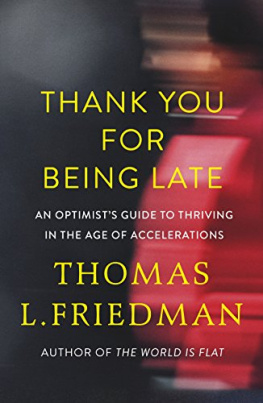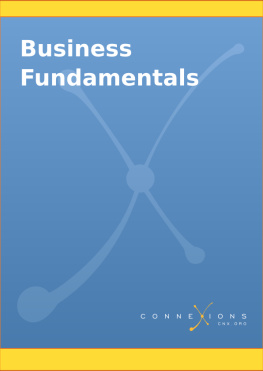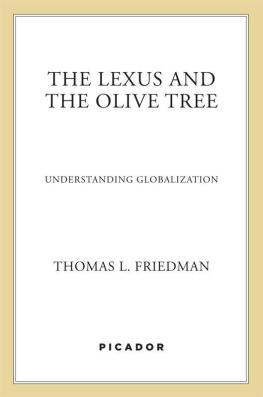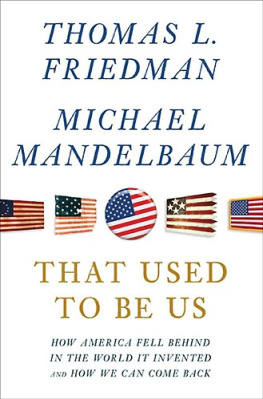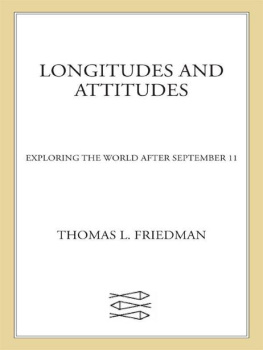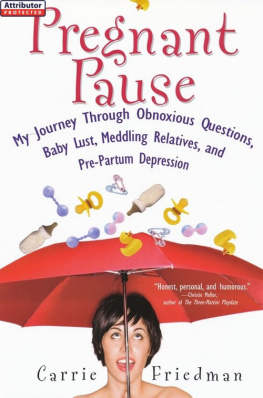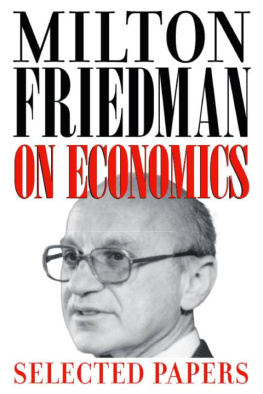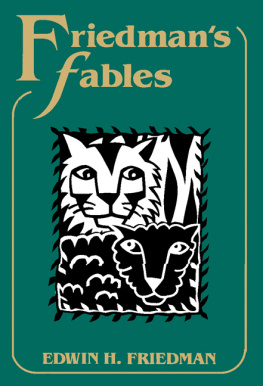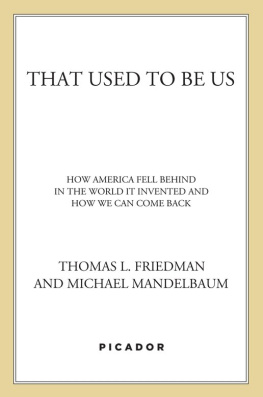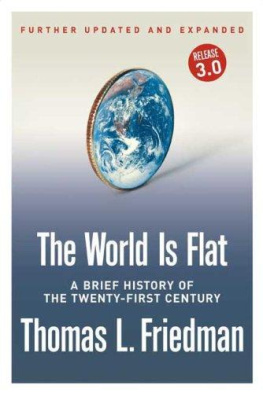Thomas L. Friedman - Thank you for being late: an optimists guide to thriving in the age of accelerations
Here you can read online Thomas L. Friedman - Thank you for being late: an optimists guide to thriving in the age of accelerations full text of the book (entire story) in english for free. Download pdf and epub, get meaning, cover and reviews about this ebook. year: 2016, publisher: Farrar, Straus and Giroux, genre: Politics. Description of the work, (preface) as well as reviews are available. Best literature library LitArk.com created for fans of good reading and offers a wide selection of genres:
Romance novel
Science fiction
Adventure
Detective
Science
History
Home and family
Prose
Art
Politics
Computer
Non-fiction
Religion
Business
Children
Humor
Choose a favorite category and find really read worthwhile books. Enjoy immersion in the world of imagination, feel the emotions of the characters or learn something new for yourself, make an fascinating discovery.
- Book:Thank you for being late: an optimists guide to thriving in the age of accelerations
- Author:
- Publisher:Farrar, Straus and Giroux
- Genre:
- Year:2016
- Rating:5 / 5
- Favourites:Add to favourites
- Your mark:
Thank you for being late: an optimists guide to thriving in the age of accelerations: summary, description and annotation
We offer to read an annotation, description, summary or preface (depends on what the author of the book "Thank you for being late: an optimists guide to thriving in the age of accelerations" wrote himself). If you haven't found the necessary information about the book — write in the comments, we will try to find it.
We all sense it--something big is going on. You feel it in your workplace. You feel it when you talk to your kids. You cant miss it when you read the newspapers or watch the news. Our lives are being transformed in so many realms all at once--and it is dizzying. In Thank You for Being Late, a work unlike anything he has attempted before, Thomas L. Friedman exposes the tectonic movements that are reshaping the world today and explains how to get the most out of them and cushion their worst impacts. You will never look at the world the same way again after you read this book; how you understand the news, the work you do, the education your kids need, the investments your employer has to make, and the moral and geopolitical choices our country has to navigate will all be refashioned by Friedmans original analysis. Friedman begins by taking us into his own way of looking at the world--how he writes a column. After a quick tutorial, he proceeds to write what could only be called a giant column about the twenty-first century. His thesis: to understand the twenty-first century, you need to understand that the planets three largest forces--Moores law (technology), the Market (globalization), and Mother Nature (climate change and biodiversity loss)--are accelerating all at once. These accelerations are transforming five key realms: the workplace, politics, geopolitics, ethics, and community. Why is this happening? As Friedman shows, the exponential increase in computing power defined by Moores law has a lot to do with it. The year 2007 was a major inflection point: the release of the iPhone, together with advances in silicon chips, software, storage, sensors, and networking, created a new technology platform. Friedman calls this platform the supernova--For it is an extraordinary release of energy that is reshaping everything from how we hail a taxi to the fate of nations to our most intimate relationships. It is creating vast new opportunities for individuals and small groups to save the world--or to destroy it. Thank You for Being Late is a work of contemporary history that serves as a field manual for how to write and think about this era of accelerations. Its also an argument for being late--for pausing to appreciate this amazing historical epoch were passing through and to reflect on its possibilities and dangers. To amplify this point, Friedman revisits his Minnesota hometown in his moving concluding chapters; there, he explores how communities can create a topsoil of trust to anchor their increasingly diverse and digital populations. With his trademark vitality, wit, and optimism, Friedman shows that we can overcome the multiple stresses of an age of accelerations--if we slow down, if we dare to be late and use the time to reimagine work, politics, and community Thank You for Being Late is Friedmans most ambitious book--and an essential guide to the present and the future.--Jacket. Read more...
Abstract: Friedman discusses how the key to understanding the 21st century is understanding that the planets three largest forces--Moores law (technology), the market (globalization) and Mother Nature (climate change and biodiversity loss)--are accelerating all at once. And these accelerations are transforming the five key realms: the workplace, politics, geopolitics, ethics, and community. Friedman posits that we should purposely be late--We should pause to appreciate the amazing historical epoch were passing through and to reflect on its possibilities and dangers.--
We all sense it--something big is going on. You feel it in your workplace. You feel it when you talk to your kids. You cant miss it when you read the newspapers or watch the news. Our lives are being transformed in so many realms all at once--and it is dizzying. In Thank You for Being Late, a work unlike anything he has attempted before, Thomas L. Friedman exposes the tectonic movements that are reshaping the world today and explains how to get the most out of them and cushion their worst impacts. You will never look at the world the same way again after you read this book; how you understand the news, the work you do, the education your kids need, the investments your employer has to make, and the moral and geopolitical choices our country has to navigate will all be refashioned by Friedmans original analysis. Friedman begins by taking us into his own way of looking at the world--how he writes a column. After a quick tutorial, he proceeds to write what could only be called a giant column about the twenty-first century. His thesis: to understand the twenty-first century, you need to understand that the planets three largest forces--Moores law (technology), the Market (globalization), and Mother Nature (climate change and biodiversity loss)--are accelerating all at once. These accelerations are transforming five key realms: the workplace, politics, geopolitics, ethics, and community. Why is this happening? As Friedman shows, the exponential increase in computing power defined by Moores law has a lot to do with it. The year 2007 was a major inflection point: the release of the iPhone, together with advances in silicon chips, software, storage, sensors, and networking, created a new technology platform. Friedman calls this platform the supernova--For it is an extraordinary release of energy that is reshaping everything from how we hail a taxi to the fate of nations to our most intimate relationships. It is creating vast new opportunities for individuals and small groups to save the world--or to destroy it. Thank You for Being Late is a work of contemporary history that serves as a field manual for how to write and think about this era of accelerations. Its also an argument for being late--for pausing to appreciate this amazing historical epoch were passing through and to reflect on its possibilities and dangers. To amplify this point, Friedman revisits his Minnesota hometown in his moving concluding chapters; there, he explores how communities can create a topsoil of trust to anchor their increasingly diverse and digital populations. With his trademark vitality, wit, and optimism, Friedman shows that we can overcome the multiple stresses of an age of accelerations--if we slow down, if we dare to be late and use the time to reimagine work, politics, and community Thank You for Being Late is Friedmans most ambitious book--and an essential guide to the present and the future.--Jacket
Thomas L. Friedman: author's other books
Who wrote Thank you for being late: an optimists guide to thriving in the age of accelerations? Find out the surname, the name of the author of the book and a list of all author's works by series.

